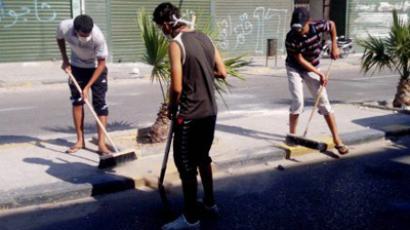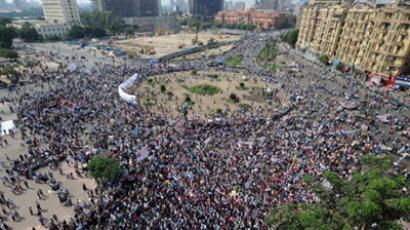'Libyan oil contracts - not the whole story'
David Cameron and Nicholas Sarkozy arrived in Libya as first signs of a rift started to appear in the National Transitional Council. The new Libyan Prime Minister has been accused of bringing in former Gaddafi officials and acting like a dictator.
John Laughland from the Institute for Democracy and Cooperation says that Nicholas Sarkozy and David Cameron went to Libya to show that Gaddafi’s regime has definitely fallen. “[They] have gone there today to publicize, to show to the world, their victory, at least in their own terms,” he told RT.Laughland stressed that even though the countries that participated in the war on the side of the rebels will be awarded oil contracts by the new Libyan government, oil was not the only reason for this war – most likely not even the main one.“Oil contracts are not the whole story.I believe that these wars – Iraq, Libya, Kosovo in 1999 – are ideological wars,” he stated. “The West, by overthrowing Gaddafi, wanted to maintain the fiction that the entire world is moving towards a western-dominated model.It wanted to show that the Arab Spring movement was a movement for a liberal Western-style democracy.”Since the Libyan government stood in the way of that apparent wave it had to be brushed aside, argues Laughland. He says the Libyan government was brought to power by NATO bombs and certain segments of Libyan tribal society, and therefore it is no surprise that it is not widely supported by the whole population.“We saw similar accusations brought against various members of the Iraqi government and those people came and went,” he told RT. “The same will happen in Libya for the simple reason that as soon as things settle down, some sort of Franco-German-American military protectorate will be set up.”“It is my prediction that this protectorate will be the effective government of Libya,” Laughland declared. “That intervention, in my view, will last for a very long time.”
The bombing campaign in Libya may have been expensive for NATO members, but in the end they will profit from it, says Eric Denece, director and founder of the French Center for Intelligence Studies.“When I was in Libya a few weeks ago, I tried to explain to the NTC that they… will have to pay with the money we are going to send them back from the amounts frozen in the Western banks,” he told RT. “They are perfectly conscious of what is going to happen. They are going to give back a lot of money to France, Great Britain and all the senior NATO countries which had been involved in this operation.”He says NATO’s goal now will be to draw public attention away from Libya and the embarrassing details of the operation.“NATO doesn’t want the world to know that its operation is not perfectly finished because of the several strongholds of the Gaddafi forces,” he said. “They also try to disguise that a lot of members of the NTC are already fighting against one another. They do not want the public to know what is really happening in Libya.”
Abayomi Azikiwe, editor of the Pan-African News website, noted that were it not for US and NATO forces, the rebels would have had little military success in Libya.“They have supplied the rebel forces with arms, with diplomatic cover and, of course, the so-called ‘no-fly zone’ over Libya,” Azikiwe told RT. “It was admitted even in The New York Times as early as March that the Obama administration had special CIA-trained units to identify targets that were bombed since March 19. Also, we have to recognize that drones were used to play a decisive role in identifying targets.” Azikiwe believes the war in Libya is far from over, with continued resistance in areas loyal to Gaddafi’s regime, such as Bani Walid and Sirte.














